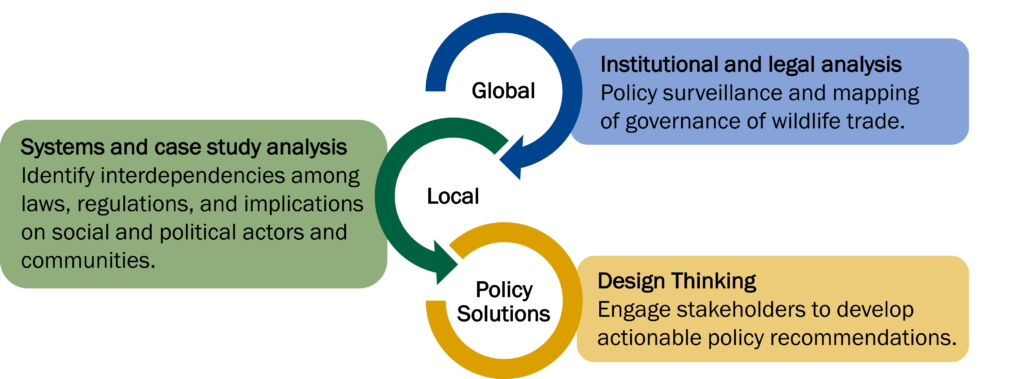Project
Last Updated on July 15, 2024
Actionable evidence focused on the regulation of wildlife trade, from which SARS and SARS-CoV-2 are believed to have emerged, is critical to prevent future pandemics. Connecting social, legal, and cultural dynamics that affect the regulation of wildlife trade in countries where zoonotic epidemics (Ebola) and pandemics (SARS and SARS-CoV-2) have emerged is needed.
The purpose of this project is to evaluate the governance gap in stewardship of international wildlife trade and implications for food and health security. We take a multi-disciplinary, multi-scale (global, national, local scales) approach to analyze the intersection of global biodiversity, environmental, agricultural, and public health governance systems.
Findings from this study will inform the development of a policy design and implementation toolkit for international organizations, as well as national and local stakeholders.
Project Activities
A solutions-oriented research approach incorporates multiple disciplinary lenses and methods to culminate in an integrative policy design and implementation plan, as follows:
- Institutional and legal analysis will provide policy surveillance and mapping of international and national governance of stewardship for the wildlife trade;
- A systems analysis will be used to identify context-specific interdependencies between policies designed to prevent zoonosis, local food systems and communities, supplemented by in-depth qualitative case studies in three countries (China, Democratic Republic of Congo, and Philippines); and
- Design thinking workshops that integrate and engage stakeholders in the development of actionable policy recommendations.

Project Team
Project Lead
Dr. Tarra L. Penney
Dr. Penney is a population health scientist focused on the prevention of disease at the global level. She is an assistant professor of Global Food, Systems and Policy Evaluation, an investigator with the Global Strategy Lab and a member of the Dahdaleh institute for Global Health Research at York University. She completed her Postdoctoral training and PhD in preventive medicine and epidemiology at the MRC Epidemiology Unit, University of Cambridge, UK. Working with national and international organizations, her research utilizes systems thinking and multiple methods to generate evaluative evidence to understand the context and impact of globalization and food systems on human and planetary health. Her work seeks to support evidence based global health policy development that can tackle some of our biggest global challenges including food insecurity, emergence of zoonoses, anti-microbial resistance and the related consequences of climate change.
Dr. Mary Wiktorowicz
Mary Wiktorowicz is Professor of Global Health Governance and Policy in the School of Global Health at York University and Associate Director of the Dahdaleh Institute for Global Health Research. She served as Associate Dean, Community and Global in the Faculty of Health and chairs the committee guiding the development of the PhD in Global Health. Prof. Wiktorowicz adopts a comparative lens to study global health governance. As co-PI for the CIHR-funded Global One Health Network, she leads a research-enabling platform on the global governance of infectious disease and antimicrobial resistance (AMR), and is a member of the WHO Collaborating Centre on the Global Governance of AMR. Her related research addresses the transnational governance of pharmaceuticals and wildlife trade regulation in preventing the emergence of zoonotic pandemics such as SARS-Cov-2. She also addresses global policy networks engaged in women’s, children’s and youth health, mental health policy, and accountability for maternal and child health in Sub-Saharan Africa and Indigenous Communities in India.
Project Team Members
Research team members:
Adrian Viens, PhD, Co-Investigator
Cary Wu, PhD, York University, Co-Investigator
Kerry Bowman, PhD, University of Toronto, Co-investigator
Shital Desai, PhD, Co-investigator
Eduardo Gallo Cajiao, PhD, Post-doctoral Fellow
Asma Atique, PhD, Post-doctoral Fellow
Chloe Clifford Astbury, PhD, Post-doctoral Fellow
Kirsten Lee, PhD, Research Coordinator
Cécile Aenishaenslin, PhD, Université de Montréal, Co-Investigator
Hélène Carabin, PhD, Université de Montréal, Co-Investigator
James Orbinski, PhD, Co-Investigator
Peter Tsasis, PhD, Co-Investigator
Collaborators:
Marilen Balolong, PhD, University of the Philippines Manila
Kathleen Chelsea Togño, MSPH Candidate, University of the Philippines Manila
Katinka de Balogh, PhD, Food and Agriculture Organization
Marc Yambayamba, MD MSc, University of Kinshasa
Mapatano Mala Ali, MD MPH PhD, University of Kinshasa
Dominique Bikaba, Strong Roots Congo
Angran Li, PhD, Zhejiang University
Bo Chen, PhD, Wuhan University
Sibo Chen, PhD, Ryerson University
Ronald Labonté, PhD, University of Ottawa
Arne Ruckert, PhD, University of Ottawa
Zhilei Shi, PhD, Zhongnan University of Economics
Funding
| This project is funded by the Canadian Institutes of Health Research and the Global 1 Health Network. |


Themes | Global Health Foresighting |
Status | Active |
Related Work |
N/A
|
Updates |
Pandemic Prevention and Global Policy in Geneva | June 25, 2024
Hot off the Press — Global Governance for Pandemic Prevention and the Wildlife Trade | April 4, 2023 |
People |
Mary E. Wiktorowicz, Associate Director - Active
Shital Desai, Faculty Fellow, School of the Arts, Media, Performance & Design - Active Peter Tsasis, Faculty Fellow, Faculty of Health - Active Kirsten Lee, CIHR Health System Impact Fellow - Active Chloe Clifford Astbury, Research Fellow, Global Food System & Policy - Alum Cary Wu, Faculty Fellow, Faculty of Liberal Arts & Professional Studies - Active Ryan Gray, Research Associate, AMR-Environmental Stewardship - Active Kerry Bowman, Adjunct Faculty Fellow - Active |
You may also be interested in...
Congratulations – Dr. Chiara Camponeschi receives 2023 Banting Postdoctoral Fellowship
The Banting Postdoctoral Fellowships program provides funding to the very best postdoctoral applicants, both nationally and internationally, who will positively contribute to the country's economic, social, and research-based growth. The objective of the Banting Postdoctoral Fellowships program ...Read more about this Post
Upcoming Webinar Series on Climate Change and Global Occupational Health and Safety
The Dahdaleh Institute for Global Health Research, Global Labour Research Centre, and ReSTORE (University of Toronto) are proud to cosponsor CIFAL York's new Climate Change and Global Occupational Health and Safety speaker series. Climate change ...Read more about this Post
Don't Miss Our November Lineup of Events
Join us for a November packed with insightful seminars, inspiring guests, and the launch of SWOT v2. Start off the month with a public seminar by visionary designer and Dahdaleh Institute community fellow Bruce Mau. ...Read more about this Post
